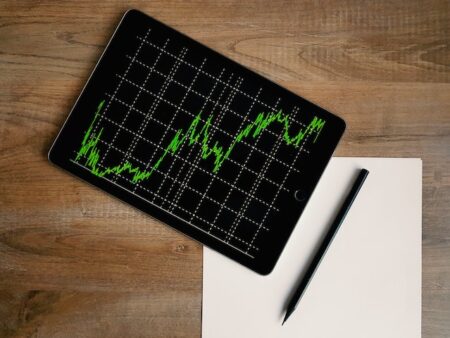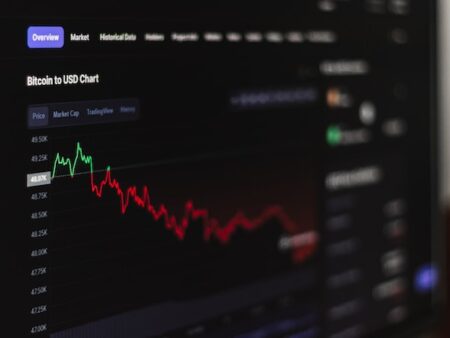Are you curious to learn more about trading accounts and how they can help you boost your wealth? Look no further! A trading account is an investment account that contains securities, cash, or other holdings. It serves as a platform for individuals to engage in financial activities such as buying and selling assets within the same trading session. By utilizing trading accounts effectively, you can enhance your money growth and achieve your financial goals.
Trading accounts offer numerous opportunities for individuals to grow their financial resources. However, it’s essential to understand the key features and requirements associated with trading accounts. These accounts require personal identification information and have minimum margin requirements set by FINRA to ensure a secure and regulated trading environment. Furthermore, trading and investing have distinct differences in their strategies and objectives. While investing takes a long-term approach, traders employ short-term strategies to maximize returns by taking advantage of both rising and falling markets.

Key Takeaways:
- A trading account is an investment account that allows individuals to buy and sell securities.
- Trading accounts require personal identification information and have minimum margin requirements.
- Investing focuses on long-term growth by buying and holding assets, while trading aims to maximize returns in a shorter timeframe.
- Successful trading requires time, effort, understanding of the markets, and consistent research.
- EasyEquities is a secure and user-friendly platform that enables traders and investors to access a wide range of investment options.
Now that you have a better understanding of trading accounts and their potential for enhancing your money growth, it’s time to explore the strategies and platforms that can help you achieve your financial goals. Stay tuned for our upcoming sections as we delve deeper into the world of trading and investing!
Evest, an emerging market maker broker, has become a favored choice for many traders, thanks to its expansive offerings and user-friendly features.
Join AvaTrade today and leverage the power of a world-class trading platform. Experience vast asset choices, top-tier tools, and unparalleled security!
Dive into the world of trading with IG – a leader in forex and CFD trading. Experience advanced platforms, vast educational resources, and a global reputation of trust.
Understanding Trading Accounts
A trading account is an investment account that holds various securities, cash, and other financial assets. It serves as a platform for traders to engage in buying and selling activities within the financial markets. Securities can range from stocks and bonds to derivatives and commodities, providing traders with a wide range of options to explore.
One of the key components of a trading account is cash, which allows traders to execute transactions seamlessly. Cash serves as the fuel that powers the buying and selling activities in the market. Additionally, trading accounts may also hold other financial assets such as mutual funds and exchange-traded funds (ETFs), depending on the preferences and strategies of the individual trader.
To gain a deeper understanding of trading accounts, it is important to consider the concept of holdings. Holdings refer to the specific investments held within the trading account, including the quantity and value of each asset. Traders carefully manage their holdings, regularly monitoring market conditions to make informed decisions about their portfolio. This active management distinguishes trading accounts from traditional investment accounts, as traders aim to capitalize on short-term market movements to generate profits.

When it comes to trading accounts, it is crucial to keep track of key market indicators and make timely decisions based on market analysis. By maintaining a proactive approach and staying informed about the latest trends and news, traders can enhance their chances of successful trading and financial growth.
Role of Trading Accounts in Day Trading
Trading accounts play a crucial role in the world of day trading, where traders execute multiple buy and sell transactions during a single trading session. These accounts are specifically designed to cater to the needs of active traders who aim to profit from short-term price fluctuations in various financial markets. A trading account typically contains securities, cash, or other holdings that traders use to engage in their buying and selling activities.
Day traders rely on their trading accounts to swiftly enter and exit positions in response to market movements. By taking advantage of both rising and falling markets, day traders strategically buy and sell assets within a shorter time frame, aiming to maximize their returns.
To illustrate the importance of trading accounts for day traders, let’s consider an example:
John, a day trader, utilizes his trading account to execute multiple trades within a single trading session. He closely monitors the markets, looking for opportunities to buy stocks at a low price and sell them when the price rises. By utilizing his trading account efficiently, John can capitalize on intraday price movements and potentially generate profits.
Successful day trading requires dedication, discipline, and a deep understanding of the markets. Traders must continuously monitor price charts, news, and other relevant information to make informed decisions. With the right trading account, day traders can execute their strategies effectively and potentially enhance their financial growth.

Key Features and Requirements of Trading Accounts
Trading accounts require certain personal identification information and adhere to minimum margin requirements regulated by FINRA. When opening a trading account, individuals are typically asked to provide their full name, date of birth, address, and social security number. This information is necessary to comply with regulatory requirements and ensure the security of the account holder’s funds.
Additionally, trading accounts must meet minimum margin requirements set by FINRA, the Financial Industry Regulatory Authority. These requirements determine the amount of capital that traders must have in their accounts in order to engage in certain types of trades. The purpose of these requirements is to mitigate risk and protect both traders and the overall stability of the financial markets.
To illustrate, let’s take a look at an example of minimum margin requirements. Suppose a trader wants to engage in a leveraged trade, where they borrow funds to amplify their buying power. If the minimum margin requirement for a particular asset is set at 50%, then the trader would need to have at least 50% of the trade’s value in their account as collateral. This ensures that the trader has sufficient funds to cover potential losses and maintain the stability of their account.
Table: Comparison of Trading Account Features
| Account Feature | Trading Account | Investment Account |
|---|---|---|
| Strategy | Short-term | Long-term |
| Asset Holding Period | Short, often within a single trading session | Long, typically months or years |
| Buy and Sell Frequency | High, frequent transactions | Lower, occasional trades |
| Risk and Reward | Higher risk, potentially higher reward | Lower risk, potentially lower reward |
| Monitoring | Consistent monitoring of asset prices | Less frequent monitoring |
It is essential for traders to be aware of the key features and requirements associated with trading accounts. Understanding personal identification information requirements and minimum margin requirements helps traders ensure compliance and manage risk effectively. By maintaining a clear understanding of these features, traders can make informed decisions and harness the potential growth opportunities offered by trading accounts.
Trading vs. Investing: Understanding the Difference
It’s important to differentiate between trading and investing, as they involve distinct strategies and goals. Traders primarily focus on short-term strategies to maximize returns. They take advantage of both rising and falling markets, entering and exiting positions over a shorter time frame. The goal of trading is to capitalize on short-term market fluctuations and generate profits.
On the other hand, investors take a long-term approach to the markets. They seek larger returns over an extended period by buying and holding assets. Investors are interested in the potential for growth and value appreciation. Their aim is to build wealth gradually and strategically.
While traders actively monitor the markets, make frequent transactions, and require a deep understanding of market dynamics, investing is comparatively more passive. Investors focus on long-term trends, fundamental analysis, and the performance of individual assets or sectors. They aim to achieve their financial objectives by selecting the right investments and allowing them to grow over time.
The Power of Strategy
Trading and investing both offer opportunities for financial growth, but the key lies in understanding your personal financial situation, risk tolerance, and the strategies that suit you best.
Traders rely on their ability to analyze short-term market movements, execute timely trades, and manage risk effectively. They employ various technical analysis tools and indicators to make informed decisions.
Investors, instead, focus on fundamental analysis, assessing the value and potential of an asset over a longer period. They consider factors such as company financials, industry trends, and market conditions to make informed investment decisions.
| Trading | Investing |
|---|---|
| Short-term strategies | Long-term approach |
| Maximize returns | Larger returns |
Trading and investing are not mutually exclusive. It’s possible to combine both strategies in a portfolio to achieve a diversified and balanced approach. The key is to understand your goals, time horizon, and risk tolerance, and adapt a strategy that aligns with your unique financial situation.
Ultimately, whether you choose to trade or invest, remember that success in the financial markets requires discipline, knowledge, and ongoing research. Continuously educate yourself about market trends, stay updated with relevant news, and consider seeking professional advice to enhance your chances of success.
Trading Strategies for Maximum Returns
Traders capitalize on both upward and downward price movements to enter and exit positions within a relatively short time frame. By carefully analyzing market trends, traders aim to identify opportunities for profit and make strategic moves accordingly. Here are some popular trading strategies that traders employ to maximize their returns:
- Day Trading: Day traders focus on buying and selling securities within the same trading session, taking advantage of intraday price fluctuations. They closely monitor the markets, looking for short-term opportunities to make quick profits.
- Swing Trading: Swing traders aim to capture shorter-term trends that last a few days to weeks. They enter positions during price swings and exit before the trend reverses. This strategy allows traders to take advantage of momentum and market volatility.
- Scalping: Scalpers aim to profit from small price movements by making rapid trades. They typically hold positions for just a few seconds to minutes, relying on quick execution and tight spreads to generate profits.
Traders use technical analysis tools, such as charts and indicators, to identify potential entry and exit points for their trades. They also employ risk management techniques, such as setting stop-loss orders to limit potential losses and trailing stops to protect profits.
Risk Disclosure:
Trading involves significant risk and may not be suitable for all individuals. Before engaging in trading, it is important to understand the risks involved and carefully consider your financial situation, risk tolerance, and investment objectives. Always seek professional advice if needed.
Successful traders devote time and effort to market research and constantly educate themselves to stay updated on market dynamics. They also develop discipline and emotional control to make rational decisions based on their trading strategies rather than impulsive reactions to market fluctuations.
Remember that trading is a highly dynamic activity, and every trader may have their own unique approach. It is essential to develop a trading plan that aligns with your financial goals and suits your trading style. With careful planning, diligent research, and disciplined execution, trading can offer opportunities for financial growth.
The Effort and Research Involved in Trading
Trading demands a considerable investment in time, effort, deep market understanding, and thorough research. Successful traders understand that consistent profitability requires dedication and a willingness to stay informed about the ever-changing dynamics of the financial markets. By putting in the necessary effort, traders can maximize their chances of making informed decisions and achieving their financial goals.
One of the key aspects of trading is the time commitment it requires. Traders must be willing to dedicate significant hours to monitor market trends, analyze charts and indicators, and identify potential trading opportunities. This ongoing involvement allows traders to react quickly to market movements and make timely decisions that can positively impact their trading results.
Effort in trading also extends to the deep understanding of the markets. Traders need to stay up-to-date with the latest news, economic releases, and geopolitical developments that can impact asset prices. By continuously expanding their knowledge and staying informed about market trends, traders can gain a competitive edge and make well-informed decisions based on the prevailing market conditions.
Furthermore, research plays a crucial role in trading success. Traders must conduct thorough research on potential investments, studying company fundamentals, financial statements, and market trends. They analyze charts, technical indicators, and historical price patterns to identify potential entry and exit points. By combining research with their understanding of the markets, traders can develop effective strategies and increase their chances of generating consistent profits.

The Importance of Market Research
Market research is an essential component of trading. It involves analyzing historical data, studying company news and financial reports, and keeping up with the latest market trends. By conducting thorough research, traders can gain valuable insights into potential investment opportunities and make well-informed trading decisions.
There are several key aspects of market research that traders should focus on. Firstly, understanding the overall market trends and sentiment is crucial. By analyzing the broader market conditions, traders can identify whether it is a bullish or bearish market and adjust their strategies accordingly.
Secondly, researching individual stocks or assets is essential for making informed trading decisions. Traders should examine the company’s financial health, performance, and growth prospects. Conducting thorough research on specific stocks or assets helps traders identify opportunities and assess the potential risks involved.
In conclusion, successful trading requires a significant investment of time, effort, deep market understanding, and thorough research. By dedicating themselves to continuous learning and staying informed about market trends, traders can enhance their decision-making abilities and increase their chances of achieving their financial goals.
| Effort | Research | Understanding of the Markets | Time |
|---|---|---|---|
| Traders must invest considerable effort in monitoring market trends and analyzing potential trading opportunities. | Thorough research is essential to make well-informed trading decisions. | Deep understanding of the markets helps traders identify trends and adjust their strategies accordingly. | Trading requires dedicating significant hours to stay informed and react quickly to market movements. |
The Concept of Investing to Build Wealth
Investors adopt a long-term approach by buying and holding assets over an extended period, with the aim of achieving larger returns. Investing in assets such as stocks, bonds, real estate, and mutual funds allows individuals to grow their wealth steadily over time. Unlike traders who focus on short-term strategies, investors understand that wealth accumulation requires patience, discipline, and a comprehensive understanding of the markets.
By buying and holding assets, investors can take advantage of the potential for compounding returns. This strategy involves reinvesting any dividends or interest earned from investments back into the portfolio. Over time, compounding can significantly boost investment returns, providing a larger nest egg for the future.
One of the key benefits of investing is the ability to weather market fluctuations. While short-term traders may be impacted by market volatility, investors are better equipped to ride out the ups and downs of the market. By taking a long-term view, investors can focus on the underlying fundamentals of their investments, rather than reacting to short-term market noise.
When deciding on an investment strategy, it’s essential to assess risk tolerance and financial goals. Investing in assets over an extended period may offer larger returns, but it also comes with its share of risks. Investors should diversify their portfolios to manage risk effectively and consider seeking professional advice to ensure their investments align with their financial objectives.
| Pros of Investing | Cons of Investing |
|---|---|
| Potential for larger returns over timeAllows for compounding of returnsLong-term perspective reduces the impact of market volatilityOpportunity to build a diverse portfolio | Investments are subject to market riskMay require a longer time horizon to achieve desired returnsRequires patience and disciplineInvestment value can fluctuate |
“In the long run, it’s not just how much money you make, but how much money you keep, how hard it works for you, and how many generations you keep it for.” – Robert Kiyosaki
Monitoring the Markets for Traders
Traders meticulously monitor the markets for any shifts in asset prices, enabling them to make informed and timely transactions. With their fingers on the pulse of the financial world, traders stay updated on the latest market trends, news, and economic indicators that impact the value of securities. By keeping a close eye on changes in asset prices, traders can seize opportunities and take advantage of market fluctuations to maximize their returns.
“The key to successful trading lies in the ability to monitor and interpret market movements,” says John Smith, a seasoned trader with over a decade of experience. “It’s crucial to stay alert and respond swiftly to price changes to execute buy or sell orders at optimal levels.”
To effectively monitor the markets, traders employ a range of techniques and tools. They use technical analysis indicators, such as moving averages, Bollinger Bands, and relative strength index (RSI), to identify potential entry and exit points for trades. They also utilize real-time market data, charts, and financial news platforms to gather information and analyze market sentiment. By combining technical analysis with fundamental analysis, traders gain a comprehensive understanding of market conditions and make calculated decisions to enhance their chances of success.
As traders navigate the fast-paced world of trading, they rely on their analytical skills, intuition, and continuous learning to adapt to changing market dynamics. They understand that monitoring the markets is not a one-time task but an ongoing process that requires dedication and discipline. By staying vigilant and remaining up-to-date with market developments, traders position themselves to capitalize on opportunities and achieve their financial goals.
| Monitoring the Markets: Key Takeaways |
|---|
| Informed traders monitor asset prices to make well-timed transactions. |
| Market monitoring involves staying updated on news, trends, and economic indicators. |
| Effective monitoring combines technical and fundamental analysis. |
| Continuous learning and adaptability are crucial for successful traders. |
The Profitability of Trading and Investing
The profitability of trading and investing hinges on an individual’s financial circumstances, risk tolerance, and understanding of the markets. Both trading and investing come with their own set of risks and rewards, and the ultimate success depends on how well these factors align with the individual’s goals and capabilities.
When it comes to trading, individuals employ short-term strategies to maximize returns. Traders take advantage of both rising and falling markets, entering and exiting positions within a shorter time frame. This requires constant market monitoring, quick decision-making, and a deep understanding of market trends. While trading can yield significant profits, it also demands a higher level of time commitment, effort, and research compared to investing.
Investing, on the other hand, follows a long-term approach. Investors seek larger returns over an extended period by buying and holding assets. This strategy allows them to benefit from the compounding effect and take advantage of the overall growth of the markets. Investing requires less active involvement compared to trading, but it still requires thorough research and a solid understanding of the assets being invested in.
Ultimately, the choice between trading and investing depends on the individual’s financial situation, risk tolerance, and capacity to navigate the markets effectively. It is recommended to carefully assess one’s goals and capabilities before embarking on any investment journey. By considering these factors and leveraging the right tools and platforms, such as EasyEquities, South African traders can enhance their chances of achieving their financial aspirations.
| Trading | Investing |
|---|---|
| Short-term strategies | Long-term approach |
| High time commitment and effort | Less active involvement |
| Constant market monitoring | Thorough research |
| Potential for quick gains | Bigger returns over time |
Trading and investing each have their own unique advantages and considerations. It’s important to align your approach with your financial goals and risk tolerance. By carefully assessing your circumstances and utilizing tools like EasyEquities, you can make informed decisions and work towards achieving your desired financial growth.
Introduction to EasyEquities: A Convenient Trading and Investment Platform
EasyEquities is a trusted platform that offers users the convenience of trading and investing in a variety of assets, including shares and ETFs, securely through the Discovery Bank app. With EasyEquities, South African traders can take advantage of the opportunities presented by the financial markets to enhance their financial growth.
Investors can access a wide range of shares and ETFs on EasyEquities, allowing them to diversify their portfolios and maximize their investment potential. Whether you’re a seasoned trader or just starting out, EasyEquities provides a user-friendly interface that makes it easy to navigate the platform and execute trades with confidence.
One of the standout features of EasyEquities is the ability to instantly transfer funds, giving traders the flexibility to take advantage of market opportunities as they arise. Additionally, the platform allows users to buy, hold, and sell shares with ease, providing a seamless trading experience.
Furthermore, EasyEquities offers rewards for achieving Vitality Money status, incentivizing traders to actively use the platform and make the most of their investments. By leveraging the secure and convenient features of EasyEquities through the Discovery Bank app, traders can confidently navigate the markets and work towards their financial goals.
Key Features and Benefits of EasyEquities
Here are some key features and benefits of using EasyEquities:
- Instant fund transfers: Quickly and conveniently transfer funds to take advantage of market opportunities.
- Buy, hold, and sell shares: Easily manage your portfolio by buying, holding, and selling shares with just a few clicks.
- Rewards for Vitality Money status: Earn rewards for achieving and maintaining Vitality Money status, further enhancing your trading experience.
| Feature | Benefit |
|---|---|
| Instant fund transfers | Seize market opportunities without delay. |
| Buy, hold, and sell shares | Manage your portfolio with ease and flexibility. |
| Rewards for Vitality Money status | Be rewarded for your trading activities and achievements. |
EasyEquities empowers South African traders to take control of their financial future by providing a secure and convenient platform to trade and invest in shares, ETFs, and other assets. With its user-friendly features and valuable rewards, EasyEquities is a reliable companion for traders looking to enhance their financial growth.
Key Features and Benefits of EasyEquities
EasyEquities provides a range of features that make it a top choice for traders and investors in South Africa. One of its key features is instant fund transfers, allowing you to quickly and easily move funds into your trading account. This ensures that you can take advantage of market opportunities without delays or complications. Whether you want to seize a promising investment or capitalize on a trading opportunity, EasyEquities has you covered.
Another standout feature of EasyEquities is the ability to buy, hold, and sell shares with ease. Through the user-friendly platform, you can navigate the market and execute trades with confidence. Whether you’re a seasoned trader or new to investing, EasyEquities provides a seamless experience that puts you in control of your financial future.
Furthermore, EasyEquities offers rewards tied to achieving Vitality Money status. As you engage in trading and investing activities through the platform, you can earn valuable rewards that enhance your overall experience. These rewards can include discounts, special offers, and other exclusive benefits, providing added value for your commitment to growing your wealth.
| Key Features and Benefits of EasyEquities |
|---|
| Instant fund transfers |
| Buy, hold, and sell shares |
| Rewards tied to achieving Vitality Money status |
With EasyEquities, you can access the financial markets with confidence and convenience. Whether you’re an experienced trader or a novice investor, the platform empowers you to make informed decisions and take control of your financial destiny. Sign up today and experience the power of EasyEquities for yourself.
Embrace the Power of Trading Accounts for Financial Growth
South African traders have the opportunity to harness the potential of trading accounts and implement proven strategies for enhancing their financial growth. A trading account is an investment account that contains securities, cash, or other holdings. It is often used by day traders who frequently buy and sell assets within the same trading session. By utilizing a trading account, traders can take advantage of short-term strategies to maximize their returns.
Unlike traditional investing, which takes a long-term approach, trading allows individuals to enter and exit positions over a shorter time frame. Traders can capitalize on both rising and falling markets, making strategic decisions to buy or sell assets based on market trends. However, it is important to note that trading requires more time, effort, understanding of the markets, and research compared to investing. Traders must constantly monitor the markets for changes in asset prices and execute frequent transactions to seize opportunities.
It’s crucial for South African traders to understand the key features and requirements associated with trading accounts. These accounts require personal identification information and have minimum margin requirements set by FINRA. By adhering to these regulations, traders can ensure the security and integrity of their trading activities. Additionally, traders should explore effective strategies that align with their financial goals and risk tolerance. Whether it’s day trading or long-term investing, each approach comes with its own unique advantages and considerations.
The profitability of trading and investing cannot be determined by a one-size-fits-all approach. It depends on an individual’s financial situation, risk tolerance, and understanding of the markets. Both trading and investing come with the possibility of risk and reward, and there is no easy answer as to which is more profitable. However, with the right knowledge and strategy, traders can leverage trading accounts to enhance their financial growth.
One platform that South African traders can explore is EasyEquities. It offers a secure and convenient way to trade and invest in shares, ETFs, and other investments through the Discovery Bank app. With features like instant fund transfers, the ability to buy, hold, and sell shares, and rewards for achieving Vitality Money status, EasyEquities empowers traders to take control of their financial journey. By embracing the power of trading accounts and utilizing platforms like EasyEquities, South African traders can pave the way for their financial growth and unlock new opportunities in the market.

Conclusion
Trading accounts offer a path to financial growth, and by understanding the nuances of trading and investing, South African traders can make informed decisions to boost their wealth. A trading account is an investment account that holds securities, cash, or other holdings. It is commonly used by day traders who engage in frequent buying and selling of assets within a single trading session. These accounts require personal identification information and must meet minimum margin requirements set by FINRA.
When it comes to trading and investing, there are key differences in strategies and goals. Traders employ short-term strategies to take advantage of market fluctuations and maximize returns. They enter and exit positions over a shorter time frame, capitalizing on both rising and falling markets. Investing, on the other hand, takes a long-term approach, with the aim of achieving larger returns over an extended period. Investors typically adopt a buy-and-hold strategy, focusing on the potential growth of assets.
Successful trading requires time, effort, a deep understanding of the markets, and extensive research. Traders must constantly monitor the markets, keeping a close eye on changes in asset prices to execute frequent transactions. It is a dynamic and demanding endeavor that requires dedication and a proactive approach. Nevertheless, the rewards can be significant if done right.
Ultimately, the profitability of trading and investing depends on an individual’s financial situation, risk tolerance, and understanding of the markets. There is no easy answer as to which is more profitable, as both come with the possibility of risk and reward. It is essential for South African traders to carefully assess their own circumstances and goals before deciding on a trading or investing approach.
EasyEquities provides a secure and convenient platform for traders and investors in South Africa. Through the Discovery Bank app, users can trade and invest in shares, ETFs, and other investments effortlessly. With features like instant fund transfers and the ability to buy, hold, and sell shares, EasyEquities offers a user-friendly experience. Traders can also enjoy rewards for achieving Vitality Money status, further enhancing their financial journey. By embracing the power of trading accounts and leveraging platforms like EasyEquities, South African traders can take control of their financial growth and strive for a prosperous future.
FAQ
Q: What is a trading account?
A: A trading account is an investment account that contains securities, cash, or other holdings.
Q: Who typically uses trading accounts?
A: Day traders who frequently buy and sell assets within the same trading session often use trading accounts.
Q: What personal information is required for a trading account?
A: Trading accounts require personal identification information.
Q: Are there minimum margin requirements for trading accounts?
A: Yes, trading accounts have minimum margin requirements set by FINRA.
Q: What is the difference between trading and investing?
A: Trading involves short-term strategies to maximize returns, while investing takes a long-term approach to the markets with a focus on buying and holding assets for larger returns over an extended period.
Q: What does trading require in terms of time and effort?
A: Trading requires more time, effort, understanding of the markets, and research compared to investing.
Q: How do traders monitor the markets?
A: Traders monitor the markets consistently for changes in asset prices and make frequent transactions.
Q: Which is more profitable, trading or investing?
A: The profitability of trading and investing depends on an individual’s financial situation, risk tolerance, and understanding of the markets. There is no easy answer.
Q: What is EasyEquities?
A: EasyEquities is a secure and convenient trading and investment platform that allows users to trade and invest in shares, ETFs, and other investments through the Discovery Bank app.
Q: What are the key features of EasyEquities?
A: EasyEquities offers instant fund transfers, the ability to buy, hold, and sell shares, and rewards for achieving Vitality Money status.





